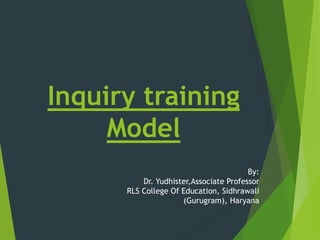
Dr. Yudhister's Inquiry Training Model Explained
- 1. Inquiry training Model By: Dr. Yudhister,Associate Professor RLS College Of Education, Sidhrawali (Gurugram), Haryana
- 2. Origin of Model This model was developed by J.Richard Suchman in 1966 This model belongs to information processing source family. This is not teaching but training model. This helps in concept formation, justification of facts, explanation of incidents and formation of principles. This is very helpful in autonomous inquiry process.
- 3. Beliefs of J.Richard Suchman All knowledge is tentative. Scientists generate theories or principles. After some tie it is pushed aside. There is no one answer of a problem. We can always more sophisticated in our explanation. There may be several equal possible answers In addition to what is already known to him, he may be taught new strategies. In a natural process , all of us enquire when confronted with a problem. An individual can be made consciously aware of process of inquiry and learn to analyze his thinking strategies. Cooperative effort helps in inquiry process.
- 4. Basic Assumptions Children are curious, eager to learn new things. We adopt inquiry method for solving problems. Training is provided to make inquiry process fast and directional. We learn to analyze thinking strategies by inquiry. Co-operative efforts enhance thinking and helps in acquiring new knowledge Inquiry process can not be programmed. Students learn better hen they participate actively in inquiry process
- 5. Focus To refine or improve inquire skills of children. To develop individual capacity for social purpose. Specification of learning outcomes. To develop the technique of scientific inquiry among students To develop intellectual strategies among students. To enable them to draw conclusions based on facts. To enable them to organize their ideas systematically. To develop autonomy or independence in learning. To develop spirit of creativity among students
- 6. Syntax of Model Phase one-Encounter with the problem : Explaining the inquiry process Presentation of the problem or puzzled situation. Phase Two-Data gathering process for verification : Verifying the nature of objects and conditions. Verifying occurrence of the problem Phase Three-Data gathering process for experimentation: Isolating irrelevant variables. Hypothesizing and testing causal relationship. Phase Four-Formulating an Explanation: Formulation rules an explanation Phase Five-Analysis of Inquiry process: Analysing inquiry strategies Developing more effective strategy
- 7. Social System In beginning, social system is highly structured. It may be relaxed when students seem to learn the principles of inquiry. Teacher and students participate equally where exchange of ideas is concerned. Teacher has to respond at every stage in such a way that students are encouraged to initiate and persuade inquiry. Open environment with proper teacher pupil interaction and pupil- pupil interaction adds to success of this model.
- 8. Principles of Reaction Weil and Joyce has given unique rules of thumb for responding and reacting to actions in the inquiry training process: Ensuring that questions are so framed which can be answered by “yes” or “no”. Using the language of inquiry process. Pointing out invalidated statements. Students will not ask teacher to give answer to a question directly. Neither rejecting or approving students hypotheses.
- 9. Principles of Reaction cond. Pressing the students for clear statements of hypotheses and more support for generalization. Students are free to consult with each other if they wish to do so. Students can test any explanation regarding hypotheses at any time. Students are free to use resource books, experimental kits and other materials. Asking students to reframe invalid questions. Encouraging interaction among students
- 10. Support System Additional support in the form of A set of confronting material. Technical understanding of intellectual process and strategies of inquiry. Resource material bearing on the problem.
- 11. Application of Model Basically this model is developed for natural science. Can be useful in all subjects areas which provide puzzling situation. Can be used for students of all age groups. Education can be provided in better way in teacher directed setti
- 14. Thanks